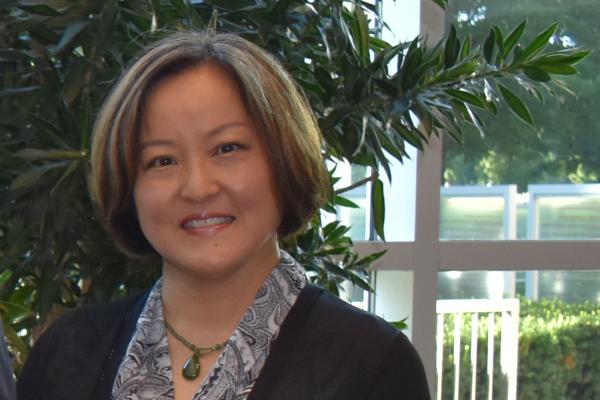EASC honors the accomplishments of Director Etsuyo Yuasa

After completing seven years of service as the director of the East Asian Studies Center (EASC), Etsuyo Yuasa, associate professor of East Asian languages and literatures, has announced that she will step down at the end of Summer 2020. In the words of Prof. Mitchell Lerner, director of the Institute for Korean Studies, Prof. Yuasa led the center with “irreplaceable commitment, passion and skillful leadership.”
In order to augment East Asian studies-related academic programming and outreach, a major emphasis of Prof. Yuasa’s tenure was securing resources to supplement the generous support from the Office of International Affairs. Since Autumn 2013, under her leadership, EASC brought more than $5 million in external funding to the university, from federal sources, private foundations, corporations and individual donations. Perhaps most impressive is the two successful Title VI proposals written by Prof. Yuasa which led to $4.5 million in US Department of Education Title VI National Resource Center (NRC) and Foreign Language and Area Studies (FLAS) Fellowship funding during a time when such national competitions were fierce.
Under Prof. Yuasa’s leadership, EASC and its constituent institutes contributed significantly to the academic mission of the university, supporting dozens of new course offerings and organizing hundreds of academic conferences, lectures and more. In addition to overseeing the entire Center’s offerings, Prof. Yuasa initiated a number of academic projects of her own. For example, she organized two well-attended symposia on the theme of “Manga at a Crossroads” in 2015 and a conference to celebrate the Center’s 50th anniversary, “East Asian Studies in the 21st Century,” originally planned for Spring 2020 but postponed until 2020-2021. In partnership with other area studies centers at OSU, she also launched the OIA Area Studies Center Conference Grants in 2019 which has awarded two faculty groups funding to organize lecture series or conferences on area studies themes.
Supporting and professionalizing students were key areas of interest for Prof. Yuasa. Under her tenure, with a combination of EASC, Title VI and Graduate School matching funds, EASC awarded more than $4 million in student support, including 163 FLAS Fellowships and 39 scholarships. Recognizing the critical need to prepare students for careers after graduation, Prof. Yuasa worked with EASC staff to develop a portfolio of professionalization programs, such as career talks, panel discussions and job shadowing opportunities. In 2016, Prof. Yuasa initiated a series of events for students on professional Japanese interpretation, culminating in the offering of a course on the same topic in Spring 2019 and 2020 which received overwhelmingly positive reviews.
Looking beyond campus, in furtherance of Ohio State’s land-grant mission, Prof. Yuasa was passionate about sharing East Asian studies expertise and resources widely in the community. Under her tenure, EASC’s efforts to train K-12 teachers blossomed, through programs such as Global Teacher Seminars, Teaching about Asia seminars, language proficiency assessment workshops and more. Through development of a partnership with the Columbus Council on World Affairs, EASC reached hundreds of
business professionals with seminars on East Asian business, economics and policy–related topics. In addition, EASC’s culture workshops, performances and film screenings brought the cultures of China, Japan and Korea to the general public.
Partnership cultivation and collaboration were hallmarks of Prof. Yuasa’s leadership. On campus, she united the EASC team, increased faculty involvement and participation in the Center and strengthened ties with numerous units, such as the University Libraries. Beyond Ohio State, she developed innovative and mutually beneficial partnerships with community colleges and minority–serving institutions, such as Columbus State Community College and Spelman College.
In the words of Prof. Hajime Miyzaki, director of the Institute for Japanese Studies, she was “a complete organizational manager for all EASC stakeholders.” Prof. Ying Zhang, director of the Institute for Chinese Studies, adds that Prof. Yuasa earned respect by “making productive connections among different perspectives, with a deep appreciation of the constituencies these perspectives represent.” Finally, the staff of EASC who worked under Prof. Yuasa’s direction used the following words to describe her leadership style: authentic, transparent, ethical, supportive and compassionate. On behalf of the entire EASC team, please join us in thanking Prof. Yuasa for her leadership, commitment and many contributions to the East Asian studies community.
